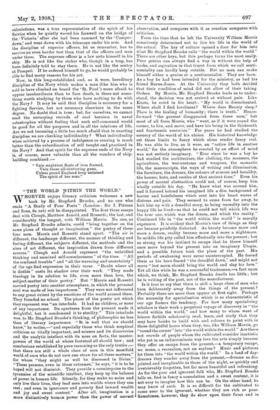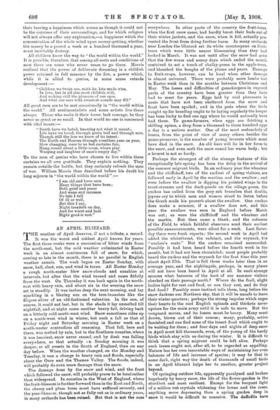"THE WORLD FITHIN THE WORLD."
WHOEVER enjoys literary criticism welcomes a new book by Mr. Stopford Brooke, and no one who reads "A Study of Four Poets" (London: Sir I. Pitman and Sons, 6s. net) will be disappointed. The first three essays deal with Clough, Matthew Arnold. and Rossetti; the last, and considerably the longest, with William Morris. No one, as Mr. Stopford Brooke admits, could "bring together on the same plane of thought or imagination" the poetry of these four men. Morris and Rossetti stand apart. "The air is different, the la.ndsCape different, the manner of thinking and feeling different, the subjects different, the methods and the aims of art different, the inspiration drawn from different sources." Clough and Arnold represent "the unbridled thinking and unmixed self-consciousness" of the time. "All the confused trouble" and "all the wavering and uncertainty" of the age find expression in their verse. "Doubt where all is.double " casts its shadow over their work. "They made theology in its relation to life, even more than love, the subject-matter of their poetry." But "Morris and Rossetti carried poetry into another atmosphere, in which the personal soul was made of less importance." They were not influenced to any great extent by the emotions of the world around them. They founded no school. The phase of the poetic art Which they represent was "an interlude. It bad no children, or none of any importance. Its apartness from the present made it delightful, but it condemned it to sterility." This interlude was, to Mr. Stopford Brooke's thinking, of philosophic no less than of literary importance. "It is well that we should know," he writes,—" and especially those who think sceptical criticism so vitally important, and science and its discoveries and the analytic intellect with its nose on facts,' the master- powers of the world at whose footstool all should bow ; and conclusions established by pure reasoning as the only truths ;- that there are still a whole class of men in this manifold world of ours who do not care one straw for all these matters," for whom "they might as well be discussed in Sirius." "These persons, even in these extremes," be says, "it is to be hoped will not diminish. They provide a counterpoise to the tyrannies of the* scientific intellect, they keep up the balance of power in human life. Silently, for they make no noise and only live their lives, they lead men into worlds where they can rest ; and even in ignorance and poverty find inward wealth and joy and sweet content." After all, imagination is a more distinctively human power than the power of correct
observation, and compares with it as creation compares with criticism, • From the time that he left the University William Morris consciously determined not to live his life in the world of the actual. The key of culture opened a door for him into
what Mr. Stopford Brooke calls "the world within tbe world." There are other keys, but this perhaps turns the most easily.
Pure genius can always find a way in without the help of books, and aspiration in that truest form which we call senti- mentality can hardly keep outside. But no man can make himself either a genius or a sentimentalist. They are born.
As a boy he bad been intended for the ministry, as bad his friend Burne-Jones. At the University they both deoiddd that their condition of mind did not allow of their taking Orders. By Morris, Mr. Stopford Brooke leads us to under-
stand, the decision was not arrived at without pain. Like Keats, be cried in his heart : "My world is disenchanted. Where shall I find loveliness? Where does Beauty sleep ? There is the healing of humanity; there is truth." Hence-
forward "the present disappeared from these men," but most of all from Morris, who "went, as if it were round the corner, to live, and move, and have his being in the thirteenth.
and fourteenth centuries." For years he had studied the scenery of the world of his choice. His historical knowledge set those limits to fancy which alone render fancy real.
He was able to live, as it were, an "active life in another world," for the atmosphere he created by an effort of mind was not entirely imaginary. "Ever since he was a boy lie had studied the architecture, the clothing, the manners, the agriculture, the war-customs and weapons, the monastic life, the manuscripts, the ways of writing and illumination, the furniture, the dresses, the colours of armour and heraldri, the houses, huts, and castles of that ancient time." Dien his power of mental abstraction could 'not, of course, keep him wholly outside' his day. "He knew what was around him, and it formed behind his imagined life a dim background of horror and hatefulness which sent into his heart waves of distress and pain. They seemed to come from far away, to knit him up with a dreadful story, to bring unreality into the happy life he lived—so that he could not tell which life was the true one, which was the dream, and which the reality."
Continued life in "the world within the world" is morally expensive. It is evident that Morris's view of things as they are became' painfully distorted. As beauty became more and more a dream, reality became more and more a nightmare. In middle life pity called him effectually into the present ; but so strong was his instinct to escape that he threw himself once more beyond the present into an imaginary Utopia, and a possible future took the place of the past. His, periods of awakening were never uninterrupted. He feared
them as his hero feared "the dreadful dawn," and might not move "lest morn should bring the world and slay his. love."
Yet all this while he was a successful tradesman,—a fact upon which, we think, Mr. Stopford Brooke dwells too little ; but he is writing of the poet, not of the manufacturer.
Is it true to say that there is still a large class of men who turn deliberately away from the things of the present ?
Probably there are more than appear at first sight. Perhaps the necessity for specialisation which is so characteristic of our age fosters the tendency. For how many specialising scholars is their work a perpetual voyage of discovery in "the world within the world," and how many to whom want of
leisure forbids scholarship read, learn, and study that they may have bricks to build with and colours to paint with in those delightful hours when they, too, like William Morris, gO "round the corner" into "the world within the world." Are there not crowds of people whom the cultivated consider inartistic
who yet in an indiscriminate way love the arts simply because they offer an escape from the present, —a. temporary escape; we mean, a recreation, not an asylum ? Music and pictures
let them into "the world within the world." In a land.of day- dreams they wander away from the present,—dreams as dis-
jointed and inexplicable as those of the night, as quickly and irretrievably forgotten, but far more beautiful and refreshing. As for the poor and ignorant folk who, Mr. Stopford Brooke tells us, find in fancy a consolation and a sweet content, it is not easy to imagine how this can be. On the other hand, he may know of such. It is so difficult for the cultivated to come near to the ignorant, whether they are rich or poor. Sometimes, however, they do show upon their faces and in
their hearing a. happiness whieh seems as though it could not be the outcome of their surroundings, and for which religion
will not always offer any explanation,—a happiness which the concentration of the whole mind upon money-getting, whether the money be a pound a week or a hundred thousand a year, must inevitably destroy.
. All children know the way to "the world within the world." It is possible, therefore, that among all sorts and conditions of men there are some who never cease to go there. Morris realised that the power of deliberate dreaming is a childish power retained in full measure by the few, a power which, while it is allied to genius, in some sense retards development :—
"Children we twain are, saith he, late made wise, In lore, but in all else most childish still, And seeking still the pleasure of our eyes. And what our ears with sweetest sounds may fill."
All great men are to be met occasionally in "the world within the world." All sentimentalists and some artists live there always. Those who make it their home lack courage, be they never so great or so small. In that world no one is concerned with vital issues :—
" Death have we hated, knowing not what it meant; Life have we loved, through gree.n leaf and through sere,
Though still the less we know of its intent: The Earth and Heaven through countless year on year,
Slow changing, were to us but curtains fair,
Hung round about a little room, where play Weeping and laughter of man's empty day.'
To the men of genius who have chosen to live within these curtains we all owe gratitude. They explain nothing. They remain outside the battle, but they certainly refresh the men of war. William Morris thus described before his death his long sojourn in "the world within the world"
"I am old and have seen
Many things that have been; Both grief and peace
And wane and increase.
No tale I tell Of in or well,
But this I say,
Night treadeth on day, And for worst and best Right good is rest."









































 Previous page
Previous page